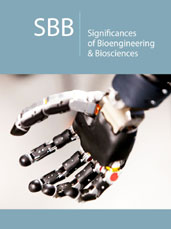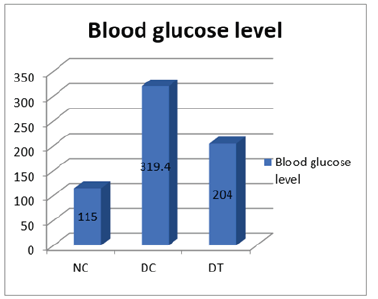- Submissions

Full Text
Significances of Bioengineering & Biosciences
Effect of an Aqueous Extract of Fenugreek (Trigonella Foenum Graecum) seeds on Hyperglycemia Induced with Alloxan
Dakah Abdulkarim*, Al Olayan Bayan and Al Khateeb Kindaa
Department of Biotechnology and Genetic Engineering, Philadelphia University, Jordan
*Corresponding author: Abdulkarim Dakah, Department of Biotechnology and Genetic Engineering, Philadelphia University, Jordan, Email: abdu83alkarim@yahoo.com
Submission: November 20, 2020 Published: December 10, 2020

ISSN 2637-8078Volume4 Issue2
Abstract
Background
Diabetes mellitus is a metabolic disease that causes high blood sugar. The number of people suffering from the disease worldwide is increasing at an alarming rate. Fenugreek (Trigonella foenum-graecum) is an herb long used in alternative medicine. This herb has many health benefits. These benefits may be due to fenugreek’s role in improving insulin function.
Objectives
To evaluate antidiabetic effects of Fenugreek seeds extract on Alloxan-induced diabetic mice.
Methods
The total of 30 mice (n=10) were grouped randomly into 3 groups as followings: Group I: Normal control (NC), Group II: Diabetic control (DC) and Group III: Treatment Diabetic Group (DT). Mice were injected with subcutaneous injection 180mg/kg body of freshly prepared of Alloxan and Diabetes mellitus confirmed by testing blood glucose, and mice with blood glucose level of ≥200mg/dl were considered as diabetic. Diabetic mice were received 10mg/kg of body weight from fenugreek extract.
Result
All Diabetic mice that received extract showed a significant decrease in blood sugar (P<0.01).
Conclusion
Fenugreek seeds reduce blood sugar levels.
Keywords: Fenugreek; Trigonella foenum graecum; Alloxan; Diabetes
Abbreviations: NC: Normal Control; DC: Diabetic Control; DT: Diabetic Treatment Group
Introduction
For long times, the people looked for drugs in nature. With the passage of time, the reasons for the usage of specific medicinal plants for treatment of certain diseases were being discovered and became founded on explicatory facts and plants had been the source of prophylaxis and treatment. Wide interest in products of medicinal plants has been observed within last years, due to the natural antimicrobial agents, cosmetics, pharmaceutical and food preservation systems [1]. Huge medicinal values of fenugreek are attributed to its chemical composition; gitogenin and yamogenin have been identified and determined as the main component for its various biological effects [2]. Also, fenugreek contains mucilaginous soluble fiber, steroidal saponins, alkaloids. In clinical study, increased insulin sensitivity was observed in fenugreek recipients, and in another one, with newly-diagnosed type-2 diabetes mellitus, serum triglycerides were reduced in patients who received a hydroalcoholic extract of fenugreek seeds 1g/day [3]. The aim of this study to investigate antidiabetic effects of local Fenugreek seeds extract on Alloxan-induced diabetic mice.
Material and Methods
Plant material and extraction procedure
The dry seeds were collected from local market, seeds were completely pulverized and 125g soaked in 500ml distilled water and placed on incubator with shaking for 24 hours at 37 °C. The solution was filtered through a filter paper and dried in the oven at 39 °C.
Experimental animal
Adult and healthy mice (Mus musculus) of 25-32g was used. The total of 30 mice (n=10) were grouped randomly into 3 groups as followings:
Group I: Normal control (NC): mice of this group did not receive induction and treatment.
Group II: Diabetic control (DC): diabetic mice of this group did not receive any treatment.
Group III: Diabetic Treatment (DT): Diabetics from this group received 10mg/kg of body weight from fenugreek extract.
Diabetic induction
Alloxan was used to induce diabetes. Mice were injected with subcutaneous injection 180mg/kg body of freshly prepared of Alloxan. Diabetes mellitus confirmed by testing blood glucose, and mice with blood glucose level of ≥200mg/dl were considered as diabetic.
Results
Effect of alloxan on blood glucose
Before Alloxan administration, basal blood glucose levels did not differ significantly between groups (106-123mg/dl), whereas 24h after Alloxan administration they were significantly higher in diabetic mice, between (219-569mg/dl).
Effect of aqueous extract on blood glucose
(Table 1 & Figure 1) show the effect of treatment with the extract on blood glucose levels. In the diabetes treated groups with 10mg/kg of body weight showed a significant decrease in blood sugar (P<0.01).
Figure 1: Effect of an aqueous extract of Fenugreek seeds on blood glucose level. Source: NC: Normal control, DC: Diabetic control, DT: Diabetes treatment.

Table 1: Effect of treatment with an aqueous extract of Fenugreek seeds on blood glucose level. Mice were received extract 10mg/kg of body weight.

Discussion
Our results agree with a lot of studies that showed hypoglycemic effects of fenugreek seeds type 2 diabetics. It has been reported that soluble fiber of fenugreek postpones digestion and absorption of carbohydrate resulting improvement of glucose homeostasis [4]. It could be by the large gel formation and low viscosity of the resulting gels inside the intestine. Galactomannan, a soluble fiber and is isolated from fenugreek seeds, responsible for decrease of blood glucose level after eating food meal, galactomannan has ability to reduce intestinal absorption of high or concentration of glucose Because of its viscous property [5].
Conclusion
Fenugreek seeds reduce blood sugar levels and advise diabetic patients to taking 0.5g of seeds per day.
References
- Dakah A, Maarrouf M (2019) Antileishmanial and antibacterial activity of essential oils of medicinal plant Achillea santolina L. Online Journal of Biological Sciences 19(1): 69-76.
- Trivedi PD, Pundarikakshudu K, Rathnam S, Shah KS (2007) A validated quantitative thin-layer chromatographic method for estimation of diosgenin in various plant samples, extract, and market formulation. J Aoac Int 90(2): 358-363.
- Nasroallah Moradi kor M, Didarshetaban MB, Saeid Pour HR (2013) Fenugreek (Trigonella foenum-graecum L.) as a valuable medicinal plant. International Journal of Advanced Biological and Biomedical Research 1(8): 922-931.
- Hannan J, Ali L, Rokeya B, Khaleque J, Akhter M, et al. (2007) Soluble dietary fibre fraction of Trigonella foenum-graecum (fenugreek) seed improves glucose homeostasis in animal models of type 1 and type 2 diabetes by delaying carbohydrate digestion and absorption and enhancing insulin action. Brit J Nutr 97(3): 514-521.
- Srichamroen A, Thomson ABR, Field CJ, Basu TK (2008) In vitro intestinal glucose uptake is inhibited by galactomannan from Canadian fenugreek seed (Trigonella foenum graecum L) in genetically lean and obese rats. Nutrition Research 29(1): 49-54.
© 2020 Dakah Abdulkarim. This is an open access article distributed under the terms of the Creative Commons Attribution License , which permits unrestricted use, distribution, and build upon your work non-commercially.
 a Creative Commons Attribution 4.0 International License. Based on a work at www.crimsonpublishers.com.
Best viewed in
a Creative Commons Attribution 4.0 International License. Based on a work at www.crimsonpublishers.com.
Best viewed in 







.jpg)






























 Editorial Board Registrations
Editorial Board Registrations Submit your Article
Submit your Article Refer a Friend
Refer a Friend Advertise With Us
Advertise With Us
.jpg)






.jpg)














.bmp)
.jpg)
.png)
.jpg)










.jpg)






.png)

.png)



.png)






